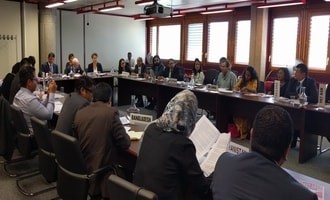 The Sri Lanka's Permanent Representative to the UN in Geneva Ambassador Ravinatha Aryasinha has called on Colombo Process (CP) member states to bring together consular representatives from Asian migrant sending countries in the GCC region, to share experiences and best practices in meeting the day-to-day consular support needs of migrants. Noting that low and semi-skilled migrant workers from the CP countries in the GCC faced similar issues, and recalling the decision of the CP Ministerial Meeting held in Colombo in August 2016 to embark on ‘Consular Cooperation’ as a new thematic area among CP countries stationed in GCC, he welcomed the operationalization of this process through the recent convening of an IOM sponsored Migrants in Countries in Crisis Initiative’s (MICIC) workshop in Kuwait to address the emergency aspects of ‘Consular Support’. He urged that the idea to bring together consular staff from CP countries in destination countries should be replicated in other GCC countries as well, and must also focus on the day-to-day consular support needs of migrants and to collaborate with destination countries for mutual interest .
The Sri Lanka's Permanent Representative to the UN in Geneva Ambassador Ravinatha Aryasinha has called on Colombo Process (CP) member states to bring together consular representatives from Asian migrant sending countries in the GCC region, to share experiences and best practices in meeting the day-to-day consular support needs of migrants. Noting that low and semi-skilled migrant workers from the CP countries in the GCC faced similar issues, and recalling the decision of the CP Ministerial Meeting held in Colombo in August 2016 to embark on ‘Consular Cooperation’ as a new thematic area among CP countries stationed in GCC, he welcomed the operationalization of this process through the recent convening of an IOM sponsored Migrants in Countries in Crisis Initiative’s (MICIC) workshop in Kuwait to address the emergency aspects of ‘Consular Support’. He urged that the idea to bring together consular staff from CP countries in destination countries should be replicated in other GCC countries as well, and must also focus on the day-to-day consular support needs of migrants and to collaborate with destination countries for mutual interest .
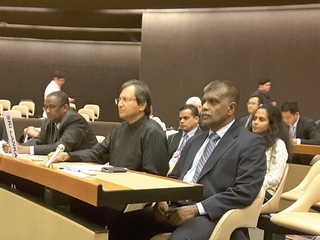
Sri Lanka participated in the 7th Meeting of the Convention on Cluster Munitions (CCM) entered into force in August 2010, held in Geneva on 4-6 September 2017, which opened today.
The attached statement was delivered by Sri Lanka’s Permanent Representative to the UN in Geneva Ravinatha Aryasinha.
Convention on Cluster Munitions (CCM) is an international treaty that addresses the humanitarian consequences and unacceptable harm to civilians caused by cluster munitions, through a categorical prohibition and a framework for action. The Convention prohibits all use, production, transfer and stockpiling of cluster munitions. In addition, it establishes a framework for cooperation and assistance to ensure adequate care and rehabilitation to survivors and their communities, clearance of contaminated areas, risk reduction education and destruction of stockpiles.
Sri Lanka’s delegation included Major General D S Weeraman psc, Brigadier W A N M Weerasinghe RSP USP and Ms. Dulmini Dahanayake, Second Secretary of the Sri Lanka Permanent Mission in Geneva.
4 September 2017
Sri Lanka Permanent Mission
Geneva
The Dengue Epidemic that has become a concern in Sri Lanka for the past few months is successfully brought under control by the measures taken by the relevant government authorities and collective effort of the general public alike, Sri Lanka Tourism confirms. Reported cases have dropped by 35-40% since mid-Julyaccording to the sources of Ministry of Health. Regular campaigns were implemented to educate, clean up areas and other preventive measures have been taking place to control the spreading of the disease under guidance and surveillance of the Ministry of Health of Sri Lanka.
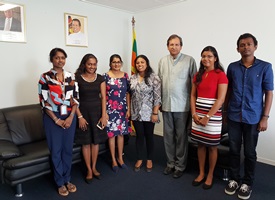
For the second consecutive year, Sri Lankan students participated in the prestigious summer student programme at the European Organization for Nuclear Research (CERN) in Geneva. The four students who completed the two months programme last week were, Ms. Thenmolie Gnanaguru a graduate of the Department of Physics, University of Jaffna, Mr. Nimmitha Karunarathna, a graduate of the Department of Physics, University of Colombo, Ms. Kaplanie Madara Liyanage, a graduate of the Department of Physics, University of Ruhuna and Ms. Chamini Shammi Pathiraja Mudiyanselage, a final year undergraduate of the Department of Physics, University of Sri Jayewardenepura.
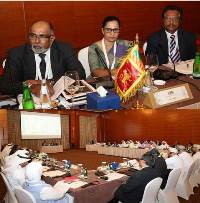
Abu Dhabi Dialogue (ADD) chaired by Sri Lanka met in Dubai for a two day Special Workshop from 4-5 July 2017 at senior officials and experts level representing the member Governments of the ADD and including observers from civil society, the private sector, and international organizations. The main objective of the workshop was to operationalize the four (04) collaborative tracks that were approved by the ADD Ministers at the Inter-Ministerial Consultation in Colombo in January this year, namely, alternative model for labour recruitment, certification of skills and recognition, comprehensive information management and Technology in the Governance of Labour Mobility. The outcome will be shared with the ongoing UN Global Compact for Safe, Orderly and Regular Migration as ADD best practices in consultation with the ADD Members States.
ADD represents one of the largest regional migration corridors.
Please see the full report on the workshop proceedings.
26th July 2017
Permanent Mission of Sri Lanka
Geneva
- The Universal Periodic Review (UPR) is a process in which the human rights records of all 193 UN Member States are reviewed periodically. It was introduced when the UN Human Rights Council was created by the United Nations General Assembly Resolution 60/251 of 15 March 2006, and it was adopted unanimously by all UN Member States. Under this process, the human rights situation of all member countries of the UN is reviewed every 4.5 years.
- The UPR is a State-driven process. Each State is given an opportunity to declare what actions have been taken to improve the human rights situation in a country and to fulfil their respective human rights obligations. The UPR is designed to ensure equal treatment for every country when their human rights situations are assessed. The ultimate aim of this mechanism is to improve the human rights situation in all countries and address human rights violations wherever they occur.
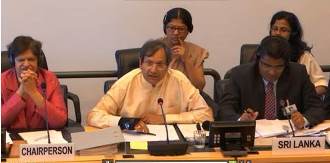
Consideration of the Fifth Periodic Report of Sri Lanka under the Committee on Economic, Social and Cultural Rights (CESCR) took place at the 61st Session of the Committee on Economic, Social and Cultural Rights, held at the Palais Wilson in Geneva, on 8-9 June 2017. Ambassador Ravinatha Aryasinha, Permanent Representative of Sri Lanka to the United Nations in Geneva led the Sri Lanka delegation and introduced the report.
